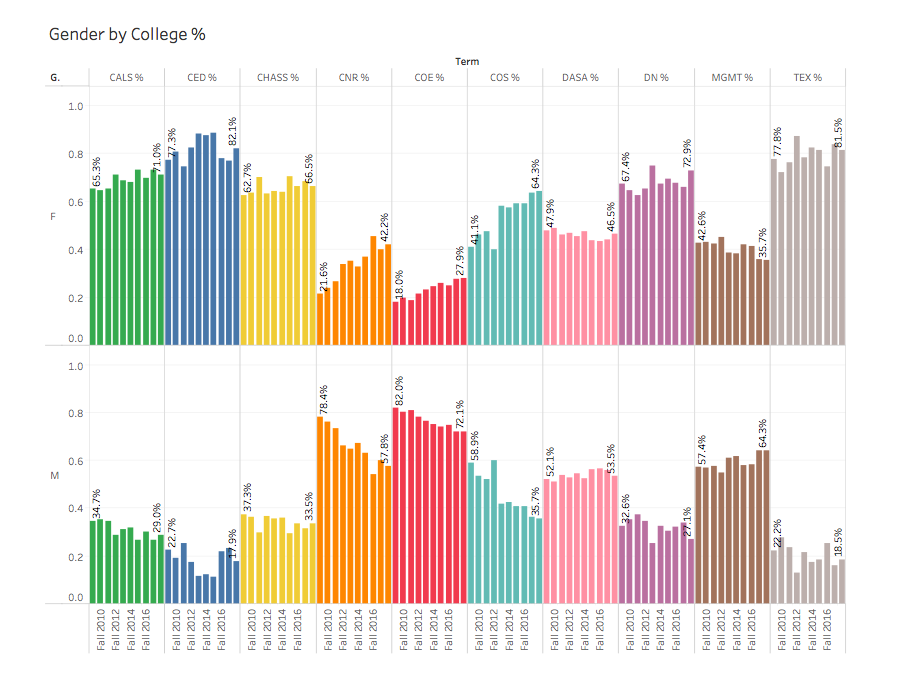This year marks the closest any NC State incoming first-year class has been to reaching the 50/50 mark of students who identify as male and female.
With 49.3 percent of students who identify as female and 50.7 percent of students who identify as male in the Class of 2022, which includes 4,889 students, this is the largest amount of women the university has had since it became open to women in 1899.
Louis Hunt, senior vice provost of Enrollment Management and Services, said that while all aspects of diversity are important to NC State, the landmark is notable because of the university’s history of being a predominantly male institution.
“Having equity in male-to-female has always been important to us,” Hunt said. “Historically, we were a male-dominated institution and that’s one type of diversity. There’s lots of types of diversity and we need them all, and so female diversity in some traditionally male-dominated disciplines I think is very important to society, and it’s great for the women that graduate in those fields.”
In the past 10 years, the most male-dominated college on NC State’s campus has been the College of Engineering. However, in eight years, the percentage of female students has increased by 10 points. Hunt said that part of that increase is because young female students see themselves finding success at the university.
“About 30 percent of our freshman class comes in College of Engineering,” Hunt said. “Ten years ago, the College of Engineering was 18 percent female, now it’s 28 percent. [It’s] just making sure that a young woman that applies to the College of Engineering can easily see herself in our materials and say ‘I’m going to fit in great here, I’m going to be highly successful and I’m going to love it.’”
Chancellor Randy Woodson also said that companies are actually seeking diversity in terms of recruitment from universities.
“If you look at areas of our economy where engineers, scientists and business leaders are recruited, those companies are looking to us to make sure we’re bringing in more women and underrepresented groups into those fields,” Woodson said.
As a third of the first-year class are in the College of Engineering, a major push on campus has been recruiting more women in fields across campus, especially in regards to creating spaces and communities for them such as the Women in Science and Engineering Village (WISE), directed by Katherine Titus-Becker.
“Dr. Katherine Titus-Becker has just done a great job to make sure females feel welcome,” Hunt said. “That they know that they are needed in those fields and they’ll be successful in those fields and that they’ll contribute very positively in those fields.”
According to Woodson, programs such as WISE that make the university feel smaller to underrepresented groups and make them feel closer to the university also help with the retention rate of those students.
“It’s like anything else in life, as long as you have a good network of people that can help you,” Woodson said. “When you’re in an underrepresented group like that, there aren’t a lot of women, for example, studying civil engineering, you want to know one another and support one another. But, I think it helps us having those groups and having the legacy of that gives us a leg up in recruiting.”
According to Hunt, while there is no specific quota NC State has to fill in terms of diversity, the university works to make sure that students can see themselves being successful at the university, primarily through marketing.
“We’ve been marketing harder to make sure women can see themselves at NC State,” Hunt said. “We highlight a lot of very successful women in a lot of our publications and things like that just to make sure we erase some ancient idea that this is a male-dominated university.”
Part of the initiative to recruit more students who identify as females to apply to NC State, especially the College of Engineering, is by the university putting emphasis on programs on campus that engage K-12 students.
“We need to do our part to reach down into lower grades and middle school and junior high and really encourage people, particularly women, to consider fields that NC State is strong in,” Woodson said. “That’s why we do engineering camp and things like that.”
Woodson said that hiring faculty that students can relate to and identify with is also helpful in terms of retention of students from underrepresented groups.
“I want to make sure that we are doing everything we can to hire mentors, women faculty and faculty from underrepresented groups, where our students that are here see themselves in the people that they work with,” Woodson said.
Hunt said that focusing on the stories of women from NC State who have gone on to find high levels of success in different fields is how he hopes the College of Engineering will reach equality in terms of percentage of students who identify as male and female.
“We’ve had women students go on and they’re in the astronauts program and they’re getting prestigious fellowships and prestigious graduate programs,” Hunt said. “We’re highlighting those stories and so more people can see themselves in that role.”








